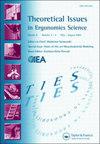Circadian effect on physiology and driving performance in semi-automated vehicles
IF 1.4
Q4 ERGONOMICS
引用次数: 0
Abstract
Abstract Human performance and physiology undergo circadian changes. The safety of driving tends to decrease at night and during the afternoon, and these changes cannot be solely addressed to the decreased visibility. Previous literature reported that circadian rhythmicity plays a role in these changes. A similar phenomenon might occur in semi-automated driving. Also, as physiology undergoes circadian changes, it was suggested that systems of driver state monitoring might have different accuracy during the day and at night. This paper investigated the circadian effect on driving performance and physiology of the driver in simulated semi-automated driving. 53 participants participated in the experiment twice, once during the day and once at night. They drove a driving simulator in the semi-automated driving scenario. Following psychophysiological functions were measured during the experiment: electromyography, electrooculography, electrocardiography, respiration, pulse, blood oxygenation, electrodermal activity, voice, sleepiness, fatigue, readiness to take-over manual control of the vehicles, mental workload, cortisol, and alpha-amylase. There was a significant correlation between circadian phase and sleepiness, fatigue, readiness to take-over manual driving, physical demand, mean autocorrelation of voice, mean noise to harmonics ratio in voice, horizontal eye movements, frequency of frontalis, mean power in frontalis, peak power in frontalis, cortisol level, and driving performance.昼夜节律对半自动车辆生理和驾驶性能的影响
人类的表现和生理经历昼夜变化。驾驶的安全性在晚上和下午有下降的趋势,这些变化不能仅仅是由于能见度下降。先前的文献报道了昼夜节律性在这些变化中起作用。类似的现象也可能出现在半自动驾驶中。此外,由于生理经历昼夜节律变化,有人建议驾驶员状态监测系统在白天和晚上可能具有不同的准确性。本文研究了模拟半自动驾驶中昼夜节律对驾驶员驾驶性能和生理的影响。53名参与者参加了两次实验,一次在白天,一次在晚上。他们在半自动驾驶场景中驾驶驾驶模拟器。实验期间测量了以下心理生理功能:肌电图、眼电图、心电图、呼吸、脉搏、血氧、皮电活动、声音、嗜睡、疲劳、接管手动控制车辆的准备情况、精神负荷、皮质醇和α -淀粉酶。昼夜节律与嗜睡、疲劳、接管手动驾驶的准备程度、身体需求、语音平均自相关、语音平均噪声谐波比、水平眼动、额肌频率、额肌平均功率、额肌峰值功率、皮质醇水平和驾驶表现之间存在显著相关。
本文章由计算机程序翻译,如有差异,请以英文原文为准。
求助全文
约1分钟内获得全文
求助全文

 求助内容:
求助内容: 应助结果提醒方式:
应助结果提醒方式:


